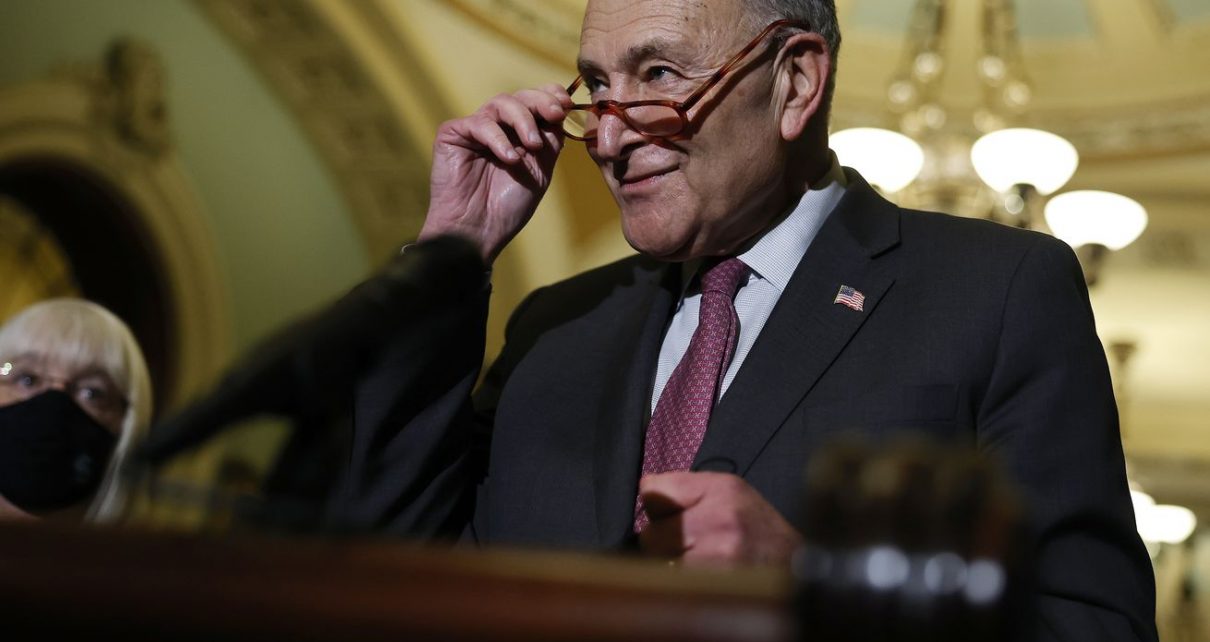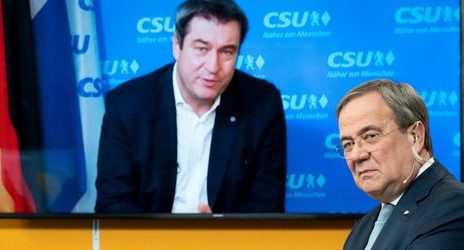
Republican senators have been been holding up Biden’s diplomatic nominees.
The Senate confirmed a long-delayed slate of executive and judicial nominees on Friday and Saturday, filling positions that been left open for months because of Republican obstruction.
The marathon Senate session, which ran into the early hours of Saturday morning before officially adjourning at just after 4 am Eastern time, included confirmation votes for 41 ambassadors and nine federal district court judges nominated by President Joe Biden, according to Punchbowl News founder Jake Sherman.
Quite the last day in session for the Senate. They confirmed 9 district court judges, 41 ambassadors and 5 other positions. They also invoked cloture on two more circuit judges.@RahmEmanuel is going to Tokyo. 48-21 vote.
— Jake Sherman (@JakeSherman) December 18, 2021
Among those confirmed were US Ambassador to Japan Rahm Emanuel, US Ambassador to France Denise Campbell Bauer, and US Ambassador to the European Union Mark Gitenstein.
The Senate also confirmed its 40th Biden-nominated judge, according to Washington Post reporter Seung Min Kim, more than any president in his first year in office since Ronald Reagan.
The last-minute rush of confirmations on Friday — the last day of the Senate’s 2021 session — was an effort to work through a backlog of about 150 presidential nominees. Many diplomatic and national security posts remain open thanks to stonewalling from Senate Republicans and the slow pace of nominations from the Biden administration. Despite Friday’s progress, many of the nominees still in the backlog will have to be re-nominated by the president in the new session, further delaying the process.
Republicans stalled confirmations to advance their own agendas
The overall process of confirming presidential nominees has become increasingly difficult in recent years, but Friday’s backlog was the result of several specific demands from Republican senators.
In particular, Sens. Ted Cruz, Josh Hawley, and Marco Rubio have all held up Biden foreign service and national security nominees until their own priorities were guaranteed a vote.
Most presidential nominees have’t been subject to the filibuster since a 2013 rule change (and none are as of 2017), so it’s not technically possible for a single Republican senator to block the confirmation of a nominee outright. They can make it a grueling process, however, by denying unanimous consent to confirm nominations.
Specifically, while a single senator doesn’t have the power to halt the process full stop — provided the nominee has the support of at least 50 senators with the vice president to break a tie — they can open up the floor for debate. That takes up significant time in the Senate, which would be a challenge at any time, but particularly when the confirmation backlog is so large and the chamber has other major priorities to address.
“In past years, many of these nominees would have sailed through with consent and cooperation, but this year a handful of Republicans have hijacked the rules of the Senate to slow the process down,” Senate Majority Leader Chuck Schumer said on the Senate floor Thursday. “It’s cynical, it’s entirely pointless, and worst of all it’s damaging — seriously damaging — to our national security.”
.@SenSchumer on confirming Biden nominees: “A handful of Republicans have hijacked the rules of the Senate to slow the process down. It’s cynical, it’s entirely pointless, and worst of all, it is damaging, seriously damaging to our national security.” pic.twitter.com/YzenPmylkg
— The Hill (@thehill) December 16, 2021
Prior to Friday, Cruz tried to strike a deal with Schumer to exchange a vote on sanctions for Russia’s Nord Stream 2 gas pipeline for votes to confirm 16 ambassadors and State Department officials, without any luck. While the US isn’t in favor of Nord Stream 2, a natural gas pipeline running from Russia to Germany, the Biden administration rescinded sanctions against the company building it to preserve the US relationship with Germany, a key ally which has approved the pipeline.
“I’ve made clear to every State Department official, to every state department nominee, that I will place holds on these nominees unless and until the Biden administration follows the law and stops this pipeline and imposes the sanctions,” Cruz said in August statement.
Ultimately, Cruz secured his vote — it’s scheduled for January 14 — and agreed to release his hold on dozens of diplomatic nominations, which were confirmed overnight.
Also: This is precisely why Schumer didn’t take the Cruz offer to confirm 16 people. he got 41 ambassadors
— Jake Sherman (@JakeSherman) December 18, 2021
Hawley has also tried Cruz’s stalling tactic, albeit with less success. After the US’s disastrous pullout from Afghanistan in August, Hawley pledged to block all of Biden’s national security and Pentagon nominees unless Defense Secretary Lloyd Austin, National Security Adviser Jake Sullivan, and Secretary of State Antony Blinken resigned their posts. That hasn’t happened, but Hawley has threatened to hold up the confirmation process “as long as it takes,” as he said in early December. “If I’m still on the floor doing this in 2023, so be it, 2024, so be it, until somebody is held accountable.”
Hawley and Cruz in particular may have broader reasons for their obstruction — both have been accused of blocking the nominations at least in part to position themselves as antagonists to Biden in potential 2024 runs.
Despite the challenges from Cruz and Hawley, Democrats pressed on with 56 total voice votes, according to the Washington Post, as well as a floor vote to confirm Emanuel as ambassador to Japan.
Schumer, for his part, seemed quite satisfied with the outcome of the long night of voting.
“At the end of the day, we will have invoked cloture on two circuit judges, confirmed nine district court judges, confirmed 41 ambassadors, and confirmed five other members of President Biden’s team,” he said Saturday, according to the Hill. “It’s been a long day but a good day’s work. I thank my colleagues.”
Ambassadorships are critical diplomatic positions
In addition to Friday’s confirmation spree, the Senate also confirmed one of Biden’s highest-profile ambassadorial nominees on Thursday after Rubio agreed to allow the confirmation of Nicholas Burns as ambassador to China to proceed smoothly.
Burns, a career diplomat who served under both Republicans and Democrats over a 30-year career, including as undersecretary of state from 2005 to 2008 and as US ambassador to NATO, was nominated in August; until this week, his position had gone unfilled for the past 14 months amid increasing US-China tensions.
Rubio had been holding Burns’s nomination hostage pending a vote on his legislation to sanction goods made by slave labor in the Xinjiang Uyghur Autonomous Region of China. The Senate passed the bill unanimously on Thursday, and Biden has indicated he will sign it into law.
But the logic of holding key nominations over individual legislative priorities, even when they’re related, is opaque at best, and potentially damaging at worst.
As Sen. Chris Murphy (D-CT) pointed out on the Senate floor in September, that kind of obstruction prevents professionals who could help accomplish those priorities, or at least manage diplomatic relationships, from doing their jobs.
“It just takes a lot of chutzpah for my colleagues to stand here on the floor and criticize the president’s conduct of foreign policy at the same time that they are refusing to allow the President to have staff to conduct foreign policy,” Murphy said.
Similarly, according to Politico, European politicians had reportedly also grown frustrated by Cruz’s obstruction prior to Friday’s confirmations. “Cruz is blocking everything,” one senior EU official lamented.
What happens next?
After filing for cloture on 22 Biden nominees up for confirmation, Schumer warned Thursday that “we could be back here in the near future doing this whole thing over again.”
That’s because, despite the number of nominees confirmed Friday, many of those still pending will have to go back to Biden’s desk to be be re-nominated in the new year — going through the same committee process and potentially giving Republicans more chances to slow-walk their confirmation.
Currently, the Senate is set to reconvene January 3, and will vote on the confirmation of Gabriel Sanchez to the Ninth Circuit Court of Appeals.
In the long term, however, the confirmation process could be revised to prevent long delays. According to Politico’s Andrew Desiderio, some senators are pushing for a rule change to prevent this sort of confirmation lag from happening again. A bipartisan group met Monday to discuss potential rule changes to prevent the kind of obstruction that contributed to the current confirmation backlog, but it’s unclear what those changes might look like.
In the interim, Murphy told Desiderio he is worried about future confirmation fights.
“My worry is that this is not going away, not just on ambassadors,” Murphy said. “I mean, everybody’s got a hold on every agency. So it just doesn’t feel like the rules, as they stand now, work for nominees.”




